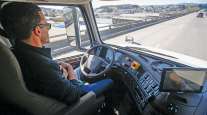Mobileye First to Test Self-Driving Vehicles in New York City

[Stay on top of transportation news: Get TTNews in your inbox.]
For the first time ever, autonomous vehicles are operating on New York City streets.
Mobileye, an autonomous vehicle company owned by Intel, announced that it has been testing its driverless cars on New York City streets since June.
Mobileye is the first and only company thus far to receive a New York AV testing permit that allows the company’s autonomous vehicles to drive in New York City, one of the country’s most challenging driving environments due to high levels of congestion and density.
“Driving in complex urban areas such as New York City is a crucial step in vetting the capabilities of an autonomous system and moving the industry closer to commercial readiness,” said Amnon Shashua, senior vice president of Intel and president and CEO of Mobileye.

Mobileye CEO Amnon Shashua takes questions at a press conference announcing the autonomous vehicle company's presence on the streets of New York City. (Mobileye an Intel Company/YouTube)
Allowing the driverless vehicles to operate on New York City streets has granted Mobileye researchers valuable insight into how effectively the company’s autonomous driving system can operate in a crowded, urban environment.
For example, the abundance of pedestrians and prevalence of jaywalking on New York City streets has helped the company assess the autonomous vehicles’ ability to identify and react to the split-second decisions often made by the city’s pedestrians.
The city’s traffic density and diversity of vehicle types has provided valuable insight into how the vehicles react around other vehicles, like buses, taxis, limousines, food trucks and more.
The high levels of double parking, something autonomous vehicles typically struggle with, according to the company, has been another invaluable asset to Mobileye’s ongoing research. The company’s vehicles currently take clues from other road users to determine when to maneuver around double-parked vehicles.
Additionally, the city’s various bridges and tunnels, as well as nonstop construction projects, give insight into how well the autonomous vehicles can recognize and adjust to ever-changing roadway configurations.
Mobileye’s self-driving cars are one of multiple autonomous vehicle test programs going on around the country.
In April, Domino’s, the world’s largest pizza company, started offering autonomous pizza delivery services to select customers in Houston through a partnership with Nuro, one of the nation’s leading autonomous vehicle companies.
“There is still so much for our brand to learn about the autonomous delivery space. This program will allow us to better understand how customers respond to the deliveries, how they interact with the robot and how it affects store operations,” said Dennis Maloney, Domino’s senior vice president and chief innovation officer.

In this scene from a Domino's commercial, an employee loads pizzas into a self-driving Nuro vehicle to deliver them to a customer. (Domino's Pizza/YouTube)
So how exactly does this driverless pizza delivery system work?
Customers who place a prepaid online order from Houston’s Woodland Heights Domino’s location during certain days and times will have the option of having their pizza delivered by the autonomous Nuro vehicle.
Those who are approved for the autonomous delivery will receive text message alerts updating them on the location of their delivery, and will be sent a unique PIN code to enter on the vehicle’s touch screen, which will open the doors and allow the customer to retrieve their order from inside.
In June, FedEx announced that it also has partnered with Nuro to test the use of driverless vehicles for multistop and appointment-based deliveries in Houston.
The deliveries are made by Nuro’s R2 vehicle, the first fully autonomous, driverless delivery vehicle to receive regulatory approval from the U.S. Department of Transportation to operate on public roads.

A customer receives a FedEx package via a self-driving Nuro vehicle. (FedEx/Nuro)
“Working with FedEx — the global leader in logistics — is an incredible opportunity to rethink every aspect of local delivery. This multiyear commitment will allow us to truly collaborate and bring Nuro’s powerful technology to more people in new ways, and eventually reach large-scale deployment,” said Cosimo Leipold, Nuro’s head of partnerships.
The R2 sports numerous innovative features that would not be possible with manually driven vehicles.
For example, the lack of sideview mirrors allows for smooth rounded contours, narrowing the size of the vehicle and allowing additional street space for motorists, bicyclists and pedestrians.
Additionally, the lack of a front windshield allows for a “Pedestrian-Protecting Front End” that absorbs energy and is capable of collapsing inward in the case of a collision, limiting damage to anything struck by the vehicle.
Last year, Waymo, another autonomous vehicle company, partnered with UPS to begin testing autonomous vehicle package pickup in Arizona.

The Waymo-UPS partnership includes Waymo’s self-driving Chrysler Pacificas transporting packages from The UPS Store locations in Phoenix to a local UPS sorting facility for processing. (UPS Inc.)
Waymo’s autonomous vehicles are being used to shuttle packages from UPS store locations to nearby sorting facilities for processing. The vehicles are operated autonomously, though a Waymo-trained driver is onboard to monitor operations.
“The UPS Store is excited to participate with Waymo in this test to explore ways to provide an even better experience for customers within our network of 4,800 retail locations,” said Tim Davis, president of The UPS Store Inc.
Want more news? Listen to today's daily briefing below or go here for more info:
Distributed by Tribune Content Agency, LLC




